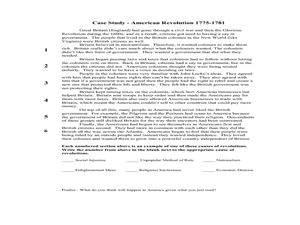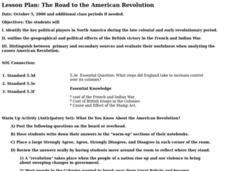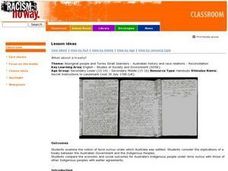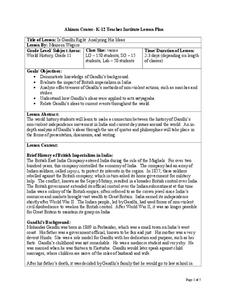Curated OER
Hitler's Fatal Gamble
Students consider the differences between totalitarianism and democracy. In this comparative politics lesson, students will read a handout describing the major components that comprise totalitarianism and democracy, then they will...
Curated OER
Differing Expectations
Students examine the expectations that colonists had for lives prior to the revolution. In this colonial America lesson, students read primary documents that feature the perceptions of white men and minorities during the time period....
Curated OER
1948 - Berlin Airlift
Young scholars examine a document from the Berlin Airlift in order to research his important event in World History.
Curated OER
Birth of a Nation
Fifth graders portray one of the actual framers of the Constitution. They summarize each class period with a journal entry and culminate the experience with the actual framing and signing (or not signing) of the Constitution.
Curated OER
World Religions
Ninth graders investigate the symbols and historical figures of the five main religions of the world. They participate in a class discussion, listen to a lecture and take notes, and write five Haikus, one about each major religion of...
National Endowment for the Humanities
Slavery and the American Founding: The "Inconsistency Not to Be Excused"
High schoolers examine slavery in the revolutionary and colonial eras of the United States. In this slavery lesson, high schoolers investigate the presence of slavery in early America, the language of the Constitution, and the intent of...
Curated OER
Fredrick Douglass...A Digital History
Seventh graders research the life of Fredrick Douglass. In this Fredrick Douglass lesson, 7th graders read about his life and discuss it. They write poetry describing his experience as a slave and create their own monument for Fredrick...
Curated OER
The Role Of NATO
Students examine the role of the North Atlantic Treaty Organization (NATO). In this NATO lesson, students research the Truman Doctrine, the Marshall Plan, Winston Churchill's "Iron Curtain" speech, and the Berlin airlift and how they...
Curated OER
NATO Geography & Language
The class receives background information on NATO, an atlas, and a blank world map. They color the original 1949 countries in red, the 1952 additions in green, and the 1990 additions in blue. This exercise would be a good starting point...
Curated OER
Case Study - American Revolution 1775-1781
In this American Revolution case study worksheet, students read a brief overview pertaining to the time period in American history and then respond to 2 short answer questions.
Curated OER
Do not Tax the Colonies
In this teaching primary resources worksheet, pupils read and excerpt of an interview with Benjamin Franklin regarding taxation . Students read the excerpt and discuss its significance.
Curated OER
The Road to the American Revolution
Fifth graders explore the causes of the American Revolution. In this American Revolution lesson, 5th graders examine the people, places, and events that led to the outbreak of war in the colonies.
Curated OER
Comic Strip
Students work in groups in order to perform research about the different aspects of immigration. Once they have completed the research a comic strip is created regarding the findings.
Curated OER
The Boston Tea Party
Students analyze the impact of Tea Act in the colonies. In this colonial America instructional activity, students listen to their instructor present a lecture regarding the Tea Act, Samuel Adams's execution of the Boston Tea Party, and...
Curated OER
World War II Erupts Chapter Review
In this World War II worksheet, pupils review a chapter as they write 10 vocabulary words that match 10 descriptions, eliminate 4 false sentences, and identify 2 themes from the history of the World War II era.
Curated OER
Fells Point's Role in Shipping and Trade
Eighth graders examine the trade and military advantages of ships built in Fells Point. In this American History lesson, 8th graders analyze primary sources. Students create an encyclopedia of Fells Point.
Curated OER
Comparing Foundations of Democracy
Students examine democratic values. In this democratic ideologies lesson, students discuss individual rights and rights of the group. Students also discuss the implications of the priorities made in democratic societies regarding rights.
Curated OER
Hitler¿¿¿s Fatal Gamble ? Comparing Totalitarianism and Democracy
Students compare/contrast totalitarianism and democracy and examine their roles in World War II. They read a handout, complete a Venn diagram, and participate in a class discussion.
Curated OER
Revolution!
Students explore events of the Revolutionary War and George Washington's role in them. They examine the forces behind the war and create timeline.
Curated OER
What is a Treaty?
Students examine the notion of terra nullius, the idea under which Australia was settled. Then they compare the economic and social outcomes for Australia's indigenous people under terra nullius with those of other indigenous peoples...
Curated OER
Understanding Freedom: Catching "The Spirit of '76"
Sixth graders complete activities about colonial history through an examination of art from the American Revolution period. In this history and art instructional activity, 6th graders define an iconic image, sing the song 'Yankee...
Curated OER
Is Gandhi Right: Analyzing His Ideas
Students explore the connection between Gandhi and the Independence Movement in India. In this lesson on social change, students examine the ideas of Gandhi to analyze non violent change. Students consider the impact of British...
Curated OER
Fight For Your Right - Leading A Revolution of Change
Students examine civil rights. In this civil rights lesson, students research human rights issues of United States history. Students then discuss their research findings and write Bill of Rights statements for the topics they researched.
Curated OER
Prisoners in Another War
Students identify violations of the Geneva Convention in video clips. They discover the role of international bodies in dealing with war crimes. They read primary source documents as well.

























